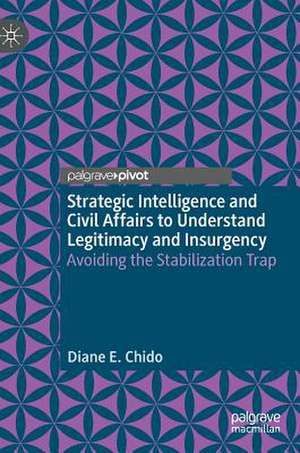Strategic Intelligence and Civil Affairs to Understand Legitimacy and Insurgency: Avoiding the Stabilization Trap
Autor Diane E. Chidoen Limba Engleză Hardback – 14 iun 2019
Preț: 417.14 lei
Nou
Puncte Express: 626
Preț estimativ în valută:
79.83€ • 82.71$ • 66.62£
79.83€ • 82.71$ • 66.62£
Carte tipărită la comandă
Livrare economică 21 martie-04 aprilie
Preluare comenzi: 021 569.72.76
Specificații
ISBN-13: 9783030209766
ISBN-10: 3030209768
Pagini: 79
Ilustrații: XXVI, 72 p. 4 illus. in color.
Dimensiuni: 148 x 210 mm
Greutate: 0.32 kg
Ediția:1st ed. 2020
Editura: Springer International Publishing
Colecția Palgrave Pivot
Locul publicării:Cham, Switzerland
ISBN-10: 3030209768
Pagini: 79
Ilustrații: XXVI, 72 p. 4 illus. in color.
Dimensiuni: 148 x 210 mm
Greutate: 0.32 kg
Ediția:1st ed. 2020
Editura: Springer International Publishing
Colecția Palgrave Pivot
Locul publicării:Cham, Switzerland
Cuprins
1. Legitimacy and Governance in Stabilization.- 2. The Stabilization Trap.- 3. Contemporary Vulnerabilities To Legitimacy.- 4. Recommendations for Regaining Legitimacy.
Notă biografică
Diane E. Chido is President of DC Analytics, a former Intelligence Studies instructor with Mercyhurst University, and former Intelligence Advisor to the U.S. Army’s Peace Keeping and Stability Operations Institute (PKSOI). Diane has worked in stabilization for over 25 years on socio-cultural issues including legitimacy, alternative governance and ethnic conflict.
Textul de pe ultima copertă
“Military professionals and policymakers alike must read what Diane Chido lays out in this book. Diane provides a clear path for the Army to obtain a comprehensive situational understanding of the operational environment, and for the U.S. Government to avoid repeating disappointing experiences from the past.”
—COL Jay Liddick, Commandant, U.S. Army Civil Affairs Brigade
“Diane Chido has done a magnificent job in describing how short-sighted it was to have downsized Civil Affairs and placed it under Special Operations. Her focus on a similar disregard among policymakers for strategic intelligence in favor of tactical urgencies explains why we are currently caught in ‘forever wars’ because we deal with symptoms every day, but seldom with the ultimate causes of armed conflicts.”
—Michael Andregg, Instructor of Justice and Peace Studies (ret.), University of St. Thomas, MN, USA
This book describes the common pitfalls of U.S. military interventions in efforts at stabilization, which supports post-conflict societies by establishing stable governance, rule of law, a safe and secure environment, economic development and social well-being for all members of the population. These efforts are often unsuccessful and can even cause harm when mission teams do not understand both the populations with whom they are engaging and policymakers. The book recommends prioritizing a relational approach to stabilization with a professional and well-resourced Civil Affairs and strategic intelligence approach to engagements over the current preference for transactional, often lethal operations.
Diane E. Chido is President of DC Analytics, a former Intelligence Studies instructor with Mercyhurst University, and former Intelligence Advisor to the U.S. Army’s Peace Keeping and Stability Operations Institute (PKSOI). Diane has worked in stabilization for over 25 years on socio-cultural issues including legitimacy, alternative governance and ethnic conflict.
Caracteristici
Provides a roadmap for the U.S. Army’s Civil Affairs personnel when engaging with fragile or post-conflict communities Designed to be accessible to newcomers or practitioners in the field, as well as enlisted officers, international volunteers, students, policymakers, and planners Relevant to actors who must understand the populations they will interact with at the ground level and those about whom they may make operational or policy-level decisions
